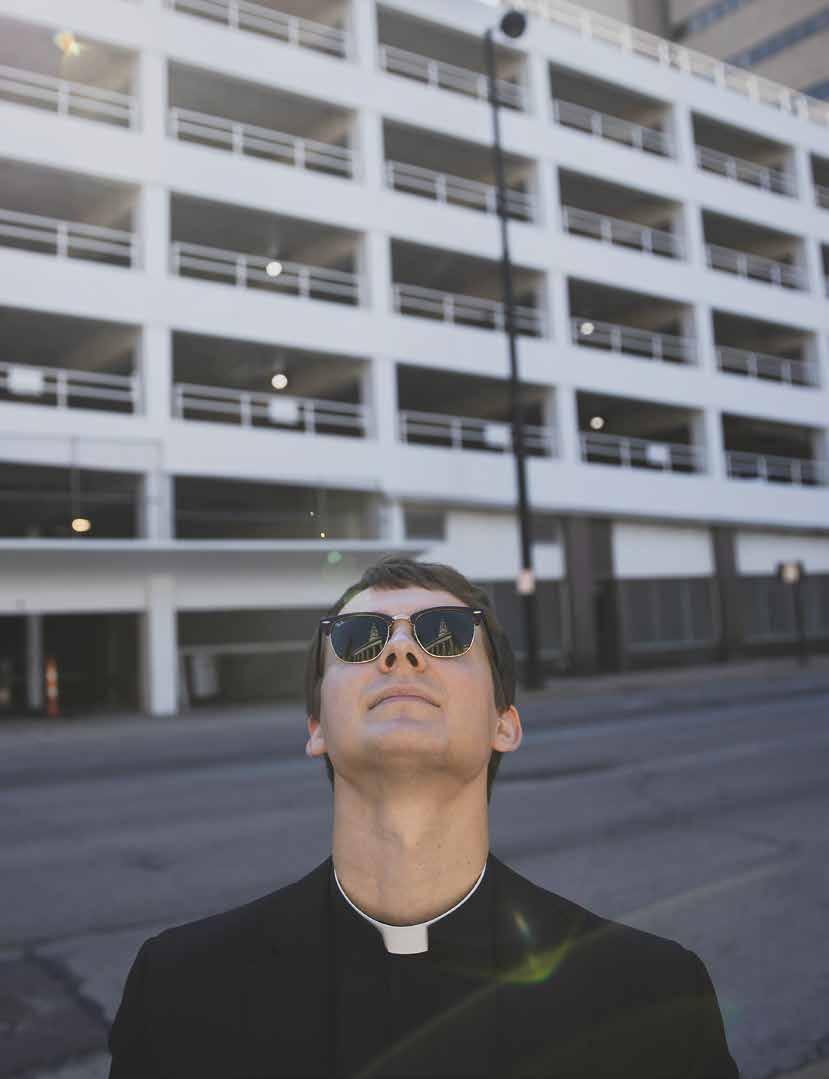
9 minute read
SEEK THE LORD
SEEK THE LORD ARCHBISHOP DENNI S M. SCHNURR
Since the onslaught of the COVID-19 pandemic and the resulting shutdown of many businesses, we have often heard the term “essential workers.” But as I pointed out in my recent pastoral letter, Radiate Christ, everyone is essential. Each of us has a role to play in the Church and in civil society because God works through human hands.
Advertisement
In the past six months our country has been rocked by the pandemic, by the disruption to lives and jobs from the resulting lockdown, and by the social upheaval that followed the senseless and brutal killing of George Floyd. It is understandable that in the face of such daunting challenges, we turn to government and other human institutions for solutions. At the same time, however, we are each called to be part of the answer by our own individual actions.
Laws, rules and policies by themselves will never obliterate the sin of racism, for example, because human beings can break laws, ignore rules and flout policies. In a letter announcing the “Holy Hour for Conversion” held at the Cathedral of St. Peter in Chains on June 3, I called for the necessary conversion of hearts that will compel change and ultimately reform our institutions and society. For by changing ourselves, we can help to change the world.
To that end, a key element of the holy hour was a very moving examination of conscience led by Deacon Royce Winters, director of the Office for African American Pastoral Ministries. This reflection helped participants confront their own responsibility to radiate the love of Christ to all people and be witnesses to His kingdom on earth, particularly in the area of racial justice.
Racial disharmony is only one aspect of the deep division we see all around us, however. Even the war against COVID-19 has not brought our country together. Instead, it has fostered more division as both government actions and personal behaviors have become flashpoints for controversy. On this issue, as with so many others today, respectful exchanges of opinion are rare, while mean-spirited judgmentalism is all too common.
This disharmony is a problem for which there is no simple government fix. It can only be solved by conversion of hearts, with God’s help, through prayer. That is why the Pastoral Center of the archdiocese has launched the Pray a Minute campaign to encourage prayer for the intention of peace, justice and goodwill in our archdiocese and in our country.
The ambitious goal of the Pray a Minute project is one million hours of prayer specifically for this intention for our country by January 1, 2021, the Catholic Church’s World Day of Prayer for Peace. That target number reflects in a very practical way both the importance of the individual person and the power of prayer. The sum is large, and yet it would only take one extra minute of prayer per day by every Catholic in the archdiocese to reach the hoped-for total. Of course, you may feel called to do more.
Although the Pray a Minute initiative is already underway, do not feel that it is too late if you have not yet joined. Additional prayer at any time will help to change you and change the world. Go to PrayAMinute.com now, if you have not already done so, to make a prayer pledge. You will also find resources there that may inspire you to try new forms of prayer.
To paraphrase the Christian writer C.S. Lewis, the purpose of prayer is not to change God, but to change ourselves. In other words, prayer is not magical thinking. It is the pathway to a deeper, life-altering personal relationship with Jesus so that we can radiate Christ and thereby be instruments of the peace, justice and goodwill that we seek. For that, we are all essential workers.
ARZOBISPO DENNIS M. SCHNURR
Desde el ataque de la pandemia COVID-19 y el cierre resultante de muchas empresas, a menudo hemos escuchado el término “trabajadores esenciales”. Pero como señalé en mi reciente carta pastoral, Radiate Christ, todos son esenciales. Cada uno de nosotros tiene un papel que desempeñar en la Iglesia y en la sociedad civil porque Dios trabaja a través de las manos humanas.
En los últimos seis meses nuestro país se ha visto sacudido por la pandemia, por el cierre resultande de la interrupción de vidas y empleos, y por la agitación social que siguió el asesinato sin sentido y brutal de George Floyd. Es comprensible que ante desafíos tan desalentadores recurrimos al gobierno y a otras instituciones humanas en busca de soluciones. Al mismo tiempo, sin embargo, cada uno de nosotros está llamado a ser parte de la respuesta por nuestras propias acciones individuales.
Las leyes, las reglas y las políticas por sí mismas nunca destruirán el pecado del racismo, por ejemplo, porque los seres humanos pueden violar las leyes, ignorar las reglas y burlar las políticas. En una carta anunciando la “Hora Santa de la Conversión” celebrada en la Catedral de San Pedro en Cadenas el 3 de junio, pedí la necesaria conversión de los corazones que obligue al cambio y, en última instancia, a reformar nuestras instituciones y nuestra sociedad. Porque cambiando a nosotros mismos, podemos ayudar a cambiar el mundo.
Con ese fin, un elemento clave de la hora santa fue un examen de conciencia muy conmovedor dirigido por Deacon Royce Winters, director de la Oficina de Ministerios De Pastoral Afroamericanos. Esta reflexión ayudó a los participantes a enfrentar su propia responsabilidad de irradiar el amor de Cristo a todas las personas y ser testigos de Su reino en la tierra, particularmente en el área de la justicia racial.
Sin embargo, la desarmonía racial es sólo un aspecto de la profunda división que vemos a nuestro alrededor. Ni siquiera la guerra contra COVID-19 ha unido a nuestro país. Al contrario, ha fomentado una mayor división a medida que tanto las acciones gubernamentales como los comportamientos personales se han convertido en puntos de inflexión para la controversia. Sobre este tema, como con tantos otros hoy en día, los intercambios respetuosos de opinión son raros, mientras que el juicio de mal espíritu es demasiado común.
Esta desarmonía es un problema por el que no hay una simple solución del gobierno. Sólo se puede resolver mediante la conversión de corazones, con la ayuda de Dios a través de la oración. Es por eso que el Centro Pastoral de la arquidiócesis ha lanzado la campaña Orar un Minuto para fomentar la oración por la intención de paz, justicia y buena voluntad en nuestra arquidiócesis y en nuestro país.
El ambicioso objetivo del proyecto Orar un Minuto es un millón de horas de oración específicamente por esta intención por nuestro país para el 1 de enero de 2021, que es la Jornada Mundial de Oración por la Paz de la Iglesia Católica. Ese número objetivo refleja de manera muy práctica tanto la importancia de la persona individual como el poder de la oración. La suma es grande, y sin embargo, sólo tomaría un minuto extra de oración por día por cada Católico en la arquidiócesis para alcanzar el esperado total. Por supuesto, es posible que se sienta llamado a hacer más
Aunque la iniciativa Orar un Minuto ya está en marcha, no sienta que es demasiado tarde si aún no se ha unido. La oración adicional en cualquier momento le ayudará a cambiarle y a cambiar el mundo. Visite PrayAMinute.com ahora, si aún no lo a hecho, para hacer una promesa de oración. También encontrarán recursos allí que pueden inspirarle a probar nuevas formas de oración.
Parafraseando al escritor cristiano C.S. Lewis, el propósito de la oración no es cambiar a Dios, sino cambiarnos a nosotros mismos. En otras palabras, la oración no es pensamiento mágico. Es el camino que altera la vida personal y hacia una relación más profunda con Jesús para que podamos irradiar a Cristo y así ser instrumentos de la paz, la justicia y la buena voluntad que buscamos. Por eso, todos somos trabajadores esenciales.
I have heard it is possible for someone who wishes to receive communion at Mass to be denied. In what cases can someone be denied communion? Is this different from being “excommunicated”?
When Catholics approach to receive communion, it is presumed that they are in a proper state to receive. A person can be denied, however, because they are known to be in grave sin or have placed themselves outside of the Church.
SIN SEPARATES The Eucharist is the Body and Blood of Jesus, and its reception is a sign of communion with Christ and His Church. Sin separates us from God. Receiving the Eucharist heals minor transgressions, but serious sin so separates one from God that the person should not receive.
According to Church law, a person “conscious of grave sin” is asked not to receive communion without previous sacramental confession, (Canon 916) since the person risks, as a St. Paul says, “eating and drinking judgment on himself” (1 Cor 11:27-29). Since it is difficult to know the state of another’s soul, the persons themselves are best able to discern their reception.
PUBLIC SIN The Church teaches that someone who “obstinately perseveres in manifest grave sin” should be denied communion (Canon 915). Grave sin is rarely known publicly, but in some cases, it is public. In this case, every effort should be made to help the person embrace the Christian life, including repentance through sacramental reconciliation. If the person cannot be reconciled to the Church, the Eucharist could be denied, but because of the delicate nature of denying communion and concern for the person’s reputation, this decision should be left to the pastor or bishop, not an individual minister. Church teachings, including membership in organizations that support racism, abortion or euthanasia. The Church recognizes that such support is often public. Out of concern for public scandal, withholding communion can be exercised.
EXCOMMUNICATION Denial of the Eucharist is not the same as excommunication, though the two are related. Rarely does the Church issue formal excommunications. When enacted, they are for the most serious of public sins. In New Orleans during the Civil Rights era, for instance, the archbishop excommunicated three pro-segregationist Catholics, two of whom eventually returned to the Church.
Most excommunications are forms of self-excommunication in which a person places oneself outside of the Church, though without any formal decree. Often these situations can be resolved. A person who contracts marriage outside of the Church, for instance, and later has their union convalidated, may again receive the Eucharist. In most cases, the status of someone who may not receive is not known to the minister, but, like the person who is aware of grave sin, the person should refrain until he or she has been reconciled.
CONVERSION In whatever form it may take, denial of communion is a call to conversion. It is not meant to be a punishment, but a remedy. As the Catechism explains, excommunication does not “restrict the scope of mercy” but “makes clear the [sin’s] gravity” (2272). It is not a permanent state, but highlights the path to reconciliation and peace. Absence from receiving the Eucharist can be a reminder of the treasures of the sacramental life, which point to the life of heaven.
FATHER DAVID ENDRES is associate professor of Church history and historical theology at Mount St. Mary’s Seminary & School of Theology.







